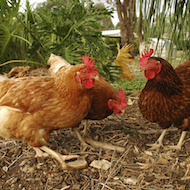
Networks to tackle issues in the laying hen industry
Bristol vet school is at the helm of a new project which aims to tackle issues of concern in the laying hen industry, through a series of 'innovation networks'.
Recent years have seen huge changes in commercial animal husbandry, as a result of increasingly strict legislation in animal welfare and production sustainability.
Fifteen researchers from five EU countries are involved in the Hennovation project. Up to 20 networks will be set up, supported by vets, farm advisors and scientific researchers, as well as those who buy eggs or certify production.
Intiailly, the networks will deal with two issues of particular concern - injurious pecking and the transportation and use of hens that no longer lay eggs.
David Main, the project's co-ordinator at the University of Bristol’s School of Veterinary Sciences, explained: “Changes in commercial animal husbandry often requires producers and industry to modify existing practices, which creates opportunities for experimentation and innovation.
"With the growing recognition that the traditional model of knowledge transfer from scientific research to industry practice has not always been effective in addressing hoped-for changes in animal welfare and environmental sustainability, a growing emphasis is now being placed on more co-operative forms of knowledge generation and experimental innovation.”
The project also hopes to inspire and support innovation in other livestock sectors.
For more information see http://hennovation.eu/index.html



 HMRC has invited feedback to its communications regarding the employment status of locum vets and vet nurses.
HMRC has invited feedback to its communications regarding the employment status of locum vets and vet nurses.